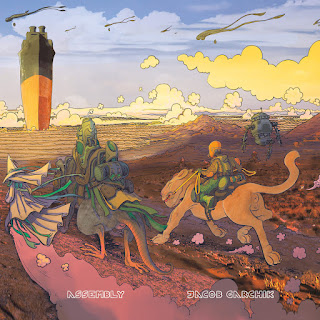By Paul Acquaro
It’s probably safe to say that everyone went at least a little stir-crazy during the first two years of COVID. Between shut-downs, bountiful misinformation, and most importantly, no live music, we were all knocked off-kilter. There was either too much time or not enough of it in the right places, but for some folks, the time was put to quite creative use, like for instance, in the case of Brooklyn based trombonist Jacob Garchik.
Garchik seems to have no trouble keeping busy, recently composing music for the Kronos Quartet Festival, in addition to playing in the bands of peers and legends like Mary Halvorson and Henry Threadgill, as well as forging his own unique way with gospel music (The Heavens: The Atheist Gospel Trombone Album, 2012), heavy metal (Ye Olde, 2015), and a rhythm section-less big band (Clear Line, 2020). However, out of mid-Pandemic frustrations, Garchik gathered associates at a studio with enough isolation booths to record a series of essentially straight ahead jazz jams. Afterwards, he took the music and spent several months cutting up and manipulating the tracks, adding, over dubbing, and forming Assembly – an aptly titled and surprisingly coherent album, considering all of that heretofore mentioned studio tomfoolery.
Along with Garchik is Sam Newsome on soprano saxophone, Jacob Sacks on piano, Thomas Morgan on bass and Dan Weiss playing drums. Like say Mostly Other People Do the Killing (who also have a recent new recording, Disasters Vol 1, out on HotCup records), the music on Assembly is both a homage to the beloved classic jazz vernacular and a reimaging of these very same overworked and well-digested forms.
It’s even in many of the track names. The first one is ‘Collage’, followed by ‘Pastiche’, which is then followed by ‘Bricolage,’ which is followed by ‘Homage’. ‘Collage’ is just that, two tracks in two different tempos overlaid simultaneously, but strangely enough, not vertigo inducing. The interlaced tracks accentuate each other at the right times, throwing the listener curve-balls, but not off their feet. ‘Pastiche’ begins with a Charlie Parker like head, a fierce and fast arpeggiated riff that seems to speed up, until releasing a melodic trombone solo over a straight ahead swing from Morgan and Weiss. ‘Bricolage’ is a duo of Morgan’s bass and Sam Newsome – Garchik looped snippets of Morgan’s playing to which the saxophonist contributed an evolving, blues-tinged, solo. ‘Homage’ begins with a serious slow groove, and according to the track notes, it is based somewhat on McCoy Tyner’s composition ‘Contemplation’. What evolves here is a dense overlaying of instruments and melodies that, if to intently listened to, may indeed cause that vertigo after all. There are many other moments to mention in the remaining tracks, but at this point, let us let the exploration be self-guided.
The overall result is a studio-constructed album that will likely not be performed live (wouldn’t that be the most MOPDTK outcome though?), and that is fine. This music needs repeated listening, ears and brains allowing the expectations of the straightforward playing and its confounding reconstructions to be fully appreciated. It doesn’t take long either.


